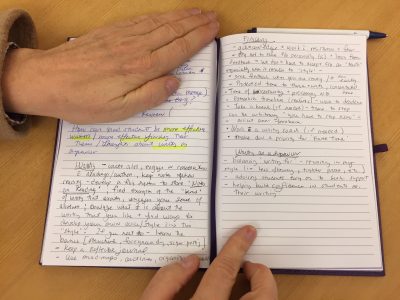
By Madeline Walker
Late one Friday afternoon in January, I sat across from Anne in the Bibliocafé to talk about writing. The metal gates were being drawn around the food counter, and most seats were empty as students went off to their week-end activities. In her role as the Associate Director of Graduate Education at UVic’s School of Nursing, Anne meets with many graduate students struggling with writing their theses and dissertations. The first thing I asked Anne was, “How can students be effective writers?”
Anne was quick to respond: “Write a lot. Engage in conversation with what you are reading—make notes, be in conversation with the author.” Anne recommended that students engage in note-taking at every stage of the dissertation. Take notes during your coursework, your research, your data analysis. “Very soon,” she said, “you will start to make connections. The analytic process is fostered through organizing one’s thoughts through writing.”
Note-taking, Anne suggests, can also be in the form of a reflective journal, a vehicle that gives you “permission to be footloose and fancy free. Especially when doing research. You can include everything. Include whatever’s happening, the feeling of being blocked, the emotional experience of writing, the personal—everything—follow all lines of thought.” Anne’s eyes lit up when she remembered how an entry she made in her reflective journal while on vacation led to musing about the verb “to vacate,” an observation that ended up in her dissertation. “You never know what gems will come up,” Anne smiled.
This talk of gems got us onto the topic of voice: How do students find their own way of writing? Anne suggested you be alert to writing that really engages you, writing that evokes a sense of aliveness. “Read to get a sense of what moves you,” she said. “If a writer really speaks to you, acknowledge that—take the writing apart—ask yourself, what is it about the style that is evocative? Don’t mimic the writing, but look at structure and style and make it your own.”
“Who do you like? Who moves you?” I asked. Anne didn’t skip a beat. “Gary Rolfe writes with passion. I’ve found his voice clear and strong, the confidence. He has an opinion,” she continued. “His writing borders on polemic, and my tendency is to be temperate, but polemic has its place,” she said with a wry grin.

“Anybody else?” I asked. “Sally Gadow, a poetic philosopher,” Anne replied. “She gave me permission to write that way. And another writer is Patti Lather—she writes fractured text, visually
‘saying’ what she means. For example, she embeds boxes in her work that disrupt the writing.”
Anne and I talked about how students can gain inspiration from writers they admire, how they can play with writing, not taking it too seriously. She reminded me that just as an academic writer’s body of work changes over time, so does the writing of graduate students as they develop their own styles and voices.
We shifted to another topic. What about writers who struggle with writing and self-expression? Anne suggests that grad students do an honest self-assessment of their writing, and if they need to learn the basics, then they can set out to learn them. It’s never too late to figure out how to work with an outline, to practice using mind-maps, to learn how to signpost and summarize. This was the perfect opportunity for me to point out that graduate students can make appointments with tutors at the Centre for Academic Communication to work on any aspect of their communication skills.
Fittingly, my last question for Anne was about finishing; how do students finish a long writing project when they feel stuck? Her answer was that we need to “acknowledge and work with fear and resistance. It’s part of the process, inherent to a sense of identity. It feels vulnerable to write, but we must find a way to be with it.”
One of the reasons students get stuck is that they get paralyzed by feedback from supervisors and committee members. Anne had this recommendation: “Try not to take feedback personally, learn from it, and know that you don’t have to accept it, especially comments about style or approach. You can differentiate what is helpful and leave the rest.” Anne also cautioned about “seeking feedback too early. In writing’s formative stages, things are in process. It’s a messy incubation period, and if you seek feedback from your supervisor too soon, the work can become even messier. You may get advice you don’t want to follow, which complicates your relationships. Instead, find peers who might be helpful, trustworthy, and honest.”
The winter sky turned purple and orange beyond the quad: It was time to part ways. Anne had to go meet some PhD students at the Grad House and my work day was over. But before we left each other, Anne added a lovely parting gift: “I know that students, as they build confidence, will write themselves into their dissertations.”
Thank you for the wise and encouraging words, Anne. May we all trust the writing process.
Dr. Anne Bruce has been with UVic since 2003. Her approaches to research and teaching invite students into (un)speakable and in-between spaces of our professional and personal lives. Her current scholarship includes understanding nurses’ experiences with medical assistance in dying and integrating contemplative approaches into teaching and learning. She believes education can inspire, transform, and generate life-long friendships.